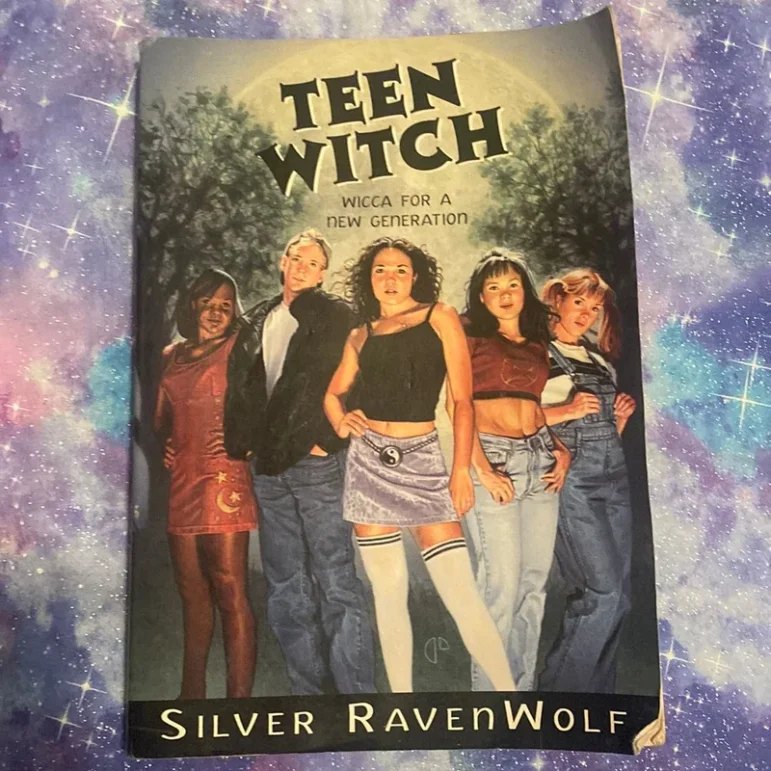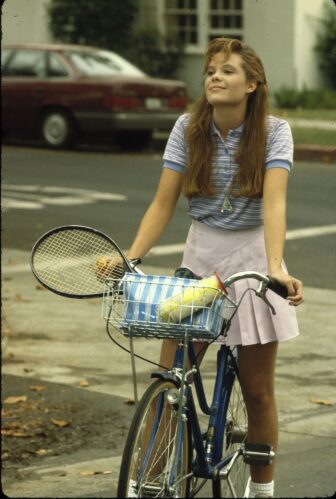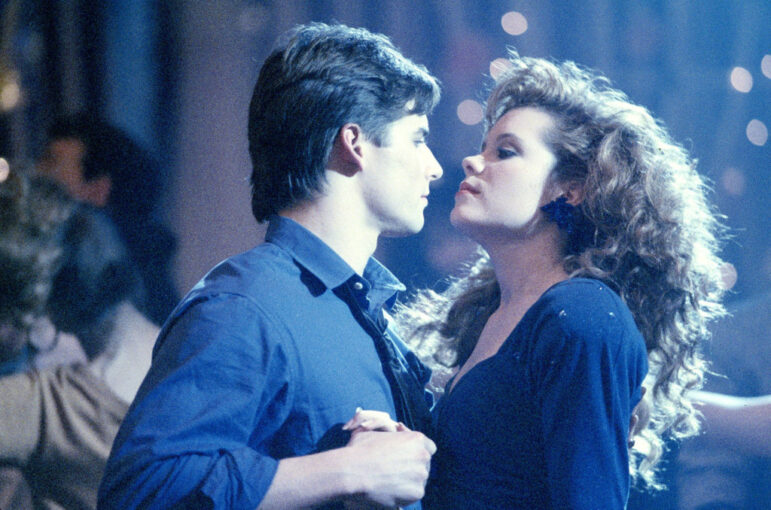
“The years between puberty and adulthood can be exciting and difficult,” wrote Silver RavenWolf in 1998. At that time, she was herself a mother of teenagers, as well as the author of Teen Witch: Wicca for a New Generation. The original cover for Llewellyn’s blockbuster grimoire for the young adult Witches of the ‘90s featured a group of kids, dressed trendy and ready to cast a circle made of pure cool.
No one would have agreed with Sliver RavenWolf more vociferously than Louise Miller, protagonist of 1989’s most tubular film: Dorian Walker’s Teen Witch.

Cover of Silver RavenWolf’s 1998 book “Teen Witch: Wicca for a New Generation” [Llewellyn]
Trapped in that exciting and difficult time, Louise (Robyn Lively) is about to turn 16. Tormented with desire for football muscle king Brad Powell (Dan Gauthier), Louise seems to lag behind her peers in the process of becoming an adult. This is a feeling commonly experienced by adolescents, writ large by Lively being 17 at the time the movie was filmed, while Gauthier was 26 and his on-screen girlfriend Randa (Lisa Fuller) was 23. The effect of an actual kid walking unsteadily in kitten heels trying to get a whole adult man to notice her is cringey and vulnerable, but it sets the all-American scene, complete with Brad’s convertible Mustang.
Obviously, this girl needs witchcraft.
In RavenWolf’s 1998 seminal text teaching kids how to try out WitchCraft [sic] to find their own path, the author does a lot of disclaiming. The opening section is addressed to parents, asking them to keep an open mind and promising them there is no devil worship within. She comments that she wishes there were an “on-off switch” that could be “glued down” until her children reach the age of 25.
After that, the book gives out the usual advice given to Witches: focus your will to see it done. But what does a teenage girl want?
Louise knows exactly what she wants when Brad, distracted by the attentions of the head cheerleader, nearly runs our hero off the road on her childish Schwinn. Louise is frustrated and embarrassed. She wants to be seen and wanted by the object of her affections. She wants to seize her own power, her sexuality, and her image. Instead, she’s combing dead leaves out of her hair, dressed like an asexual librarian at a fiber arts conference, and seen only as the object of pity.

Robin Lively as Louise in Teen Witch (1989) [Amazon MGM]
Distressed and caught in the rain, Louise does what the young Witch in any movie does: she seeks out the establishment of an older, wiser Witch.
Fans of Poltergeist will be pleased to see the outspoken AIDS and disability activist Zelda Rubinstein in the role of Madam Serena, a would-be palm reader who tries to empty Louise’s wallet, thinking her a mark. However, Serena sees in the girl’s palm that she’s a genuine Witch. Serena warns that the girl’s power is about to come to full flower on her 16th birthday.
To which Louise says: sweet!
Teen Witch is a deeply unserious film, intended originally as a gender-swapped Teen Wolf. It doesn’t concern itself with the origin or the meaning of being a witch. In this universe, witches are simply born and then reincarnated to wield their magic again and again. Serena has access to some books, and Louise’s amulet is delivered to her through serendipity alone, but there are no rules and no cost to this system of magic. There are hints that Louise’s power is strongest now, in her adolescence, while Serena’s is almost gone. To achieve a difficult spell, Serena takes the girl’s hand and says, “now relax and gimme the juice!” We must conclude that Serena’s own juice is all but squeezed, but it’s never explained. Nor does Louise react with much surprise or disbelief as her own powers grow. This is simply how the world works, and she intends to use it to her advantage.
And use it she does! Louise gets to work at once: commanding the wind, turning her rat-eyed sociopath younger brother into a dog, banishing an attempted rapist into some unknown outer darkness. (For real: she wishes this guy would “leave her alone” and he disintegrates, never to be seen again. 100/10, no notes.) She makes herself into the most popular and fashionable girl in school. Fashion is one of the most fun elements of this film; anyone who gets invited to an ‘80s themed party should look no further for inspiration than Teen Witch.
However, Louise’s exercise of her own will brings her a dubious prize. She secures the affections of Brad the Chad, exemplified in a very innocent scene of hugging and kissing set to a soft porn score. Impressively, the movie never turns an objectifying gaze on the young Lively. When she’s attired like a fashion model, her clothes are still age-appropriate and shot to express the power she feels in them rather than her availability in any sexual sense. When she’s alone with Brad, he’s the first to remove clothing. He’s the object of desire – both hers and that of the camera lens. When they reach second base, it’s her hand up his shirt, caressing the prominent lats of his athletic back. Her will is done, but she’s not satisfied.

Brad (Dan Gauthier) and Louise (Robin Lively) in “Teen Witch” (1998) [Amazon MGM]
RavenWolf leads off with a promise that there’s no devil in her book, because the 1990s version of Wiccan PR was concerned, first and foremost, with assimilation and interfaith dialogue. We engaged earnestly all through that decade with people who misunderstood us on purpose, using the language of their own spiritual antagonist to describe our religion. That did not work. Wisely, Teen Witch doesn’t bother with gods or devils at all, instead locating the power to shape reality squarely in the will of the individual.
Louise doesn’t worship and she doesn’t propitiate. She doesn’t question where the power comes from or why it was meant to be hers. She trusts herself and fate to bring her desires into being – but still questions whether her desires are worth sating, and at what cost.
It’s more witchcraft than Wicca by a hot-pink mile, but it holds up better than expected.
Unfortunately, 1989 also marked the birth of chart-topping hip-hop for a wider audience; we were just months away from the debut of Vanilla Ice. There is no devil in Teen Witch, but there is a trio of white rappers. The film’s cult status is owed mostly to the fever dream rap battle song “Top That,” wherein Louise’s bashful friend is pushed via magical courage to step to her crush and embarrass herself at least as badly as he has done. A tragic cheerleader routine wherein girls do aerobics while shout-singing “We Like Boys!” runs a scary second.
The whole of the film is about adolescence and the burden of burgeoning self-concept and sexuality. But if you look at it right, Louise does everything a young witch would try to do. She gets hilarious revenge against a teacher who humiliated her. She aspects the goddess to become more beautiful and powerful in her social circle. She gives out good luck to her beloved theater teacher, setting the woman up for a comfortable and romantic retirement.
And in the end, she finds that she doesn’t need the book, the teacher, or the amulet. The magic was within her all along.
Silver Raven Wolf could never top that.
Teen Witch is available for streaming on Tubi, and will enjoy a 35th anniversary engagement in Alamo Drafthouse Theaters this summer.
The Wild Hunt is not responsible for links to external content.
To join a conversation on this post:
Visit our The Wild Hunt subreddit! Point your favorite browser to https://www.reddit.com/r/The_Wild_Hunt_News/, then click “JOIN”. Make sure to click the bell, too, to be notified of new articles posted to our subreddit.